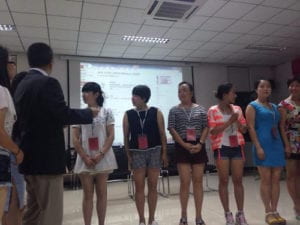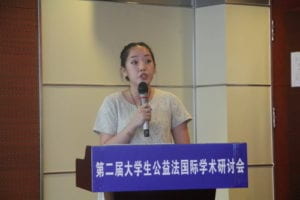Angie Liao
Zhicheng Public Interest Lawyers
Beijing, China
The past few weeks have been a crazy blur of activity. There have been several days I was so busy, I couldn’t leave the office until after 10PM! Yet, if there’s anything this summer has taught me, it’s that when you love and believe in the work you are contributing, extra hours are exponentially less taxing. Still taxing, just much less so.
I won’t flood this post with details about every little thing I’ve been working on. Instead, I’d like to narrow it down to talk about two events at Zhicheng that happened the past two months, in which I was involved. One is a new Zicheng program, the Country Kindergarten Development Program (CKDP), which is relevant to pressing social issues in China and whose execution I found so immensely inspiring.
As I mentioned in my previous post, Zhicheng has a department dedicated to providing pro bono legal services and other assistance to China’s migrant worker population. Here, the term “migrant worker” applies to anyone who leaves his/her province or town and migrates to a bigger city in order to find more job opportunities. To give you some perspective on how many migrant workers in China need service: their population is basically equal to that of the entire United States of America.
The lives of migrant workers in China aren’t easy. They tend to lead transient lives and can often be seen in train stations bringing their belongings from city to city, following wherever the jobs are. Ultimately, almost all children of migrant workers must be left behind in their home provinces or towns.
There are many reasons for this. Most predominant is the financial strain of supporting children when workers move to expensive cities. Migrant workers tend to work time-consuming jobs in factories or the service industry, leaving them no time to look after their children in the cities.
Another reason is China’s infamous hukou household registration system. Under this restrictive system, even if migrant workers can afford to bring their children to the cities, the children can be barred from attending city schools or sitting for local academic exams because their hukou is in another province.
While life can be a struggle for migrant workers, it is just as much or even more so for their children who remain back home. They might be left in the care of their grandparents or other relatives, including older siblings who are still children themselves. Typically their only income source is the money their parents can afford to send home.
Zhicheng’s director, Tong Lihua, conceived the CKDP to outreach to as many migrant workers’ children as possible: through their kindergarten teachers. For abandoned children in rural areas, kindergarten can be a beacon of hope and a singular source of care, nourishment, and of course, education. Kindergarten teachers in rural areas are especially vital to the wellbeing and development of their pupils.
The CKDP was a three-day seminar where educational experts volunteered to give lectures and host exercises. Kindergarten teachers from rural areas all over China were invited to Beijing to receive training on how to best to care for young children and contribute to their lives. Their food and stay was free, giving many of them an opportunity for further education and training that might not otherwise be accessible. Some teachers had never before been to Beijing. One stood on a train for sixty hours to attend the seminar.

The most incredible part of the seminar for me was the closing ceremonies. After three days of intensive training, discussion, and workshops, the kindergarten teachers all sat in a conference room and simply exchanged stories and sentiments about their role as teachers in poor, rural areas. They shared stories of unimaginable perseverance on the part of themselves and their pupils. I walked away with a better understanding of how much a difference kindergarten teachers make in the lives of abandoned children in rural areas. What a comfort it can be to migrant worker parents to know that someone is looking after their children at home.
Zhicheng hopes to host many more CKDP seminars in the future and to eventually make the program international. I was so proud to witness the work that Zhicheng did with these teachers and was honored to have a chance to meet individuals who work so selflessly for the wellbeing of their students.
The other event I wanted to mention is the Second International Student Forum on Public Interest Law. This was an all-day conference organized and hosted by the Zhicheng interns last month at the China University of Political Science and Law. Both international and Chinese interns presented our comparative research on various public interest issues in China and other countries. My talk focused on child welfare policy around the world and what China can learn from the child welfare successes and failures of different countries. Here’s a picture of me speaking!
I was really proud to be able to share the research I’ve been conducting on the rights of children sanctioned around the world, but I was even more proud to be part of an event that stands for the benefits of further globalizing Chinese society. It’s so important that China maintains dialogue with other countries as it develops its welfare programs and looks to better protect the socioeconomic rights of its enormous population. One of the guest commentators at our forum also mentioned what a vital initiative it is to continue bringing international dialogue into China in any form possible.
Between the research, administrative work, outreach, coordination, etc., that went into organizing and preparing for the forum, the past weeks have been a whirlwind. And this is just an excerpt! My internship ends tomorrow, so when I return to New York I hope to sit down and record more reflections and stories from this experience. It’s been without a doubt the best summer of my life.
And just for fun: a picture of me casually posing on the Great Wall!

